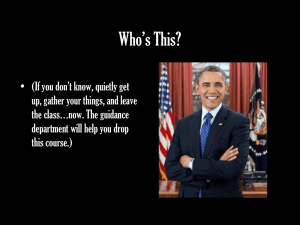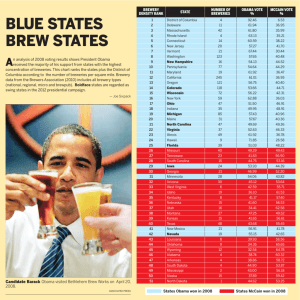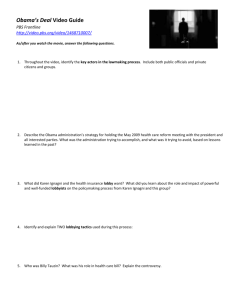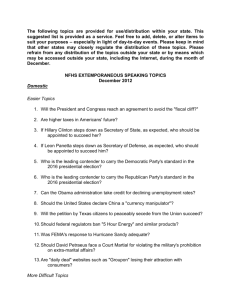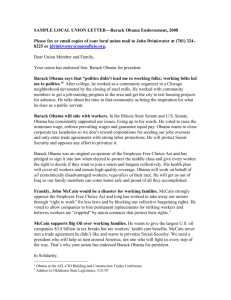Obama wins historic US election (BBC)
advertisement
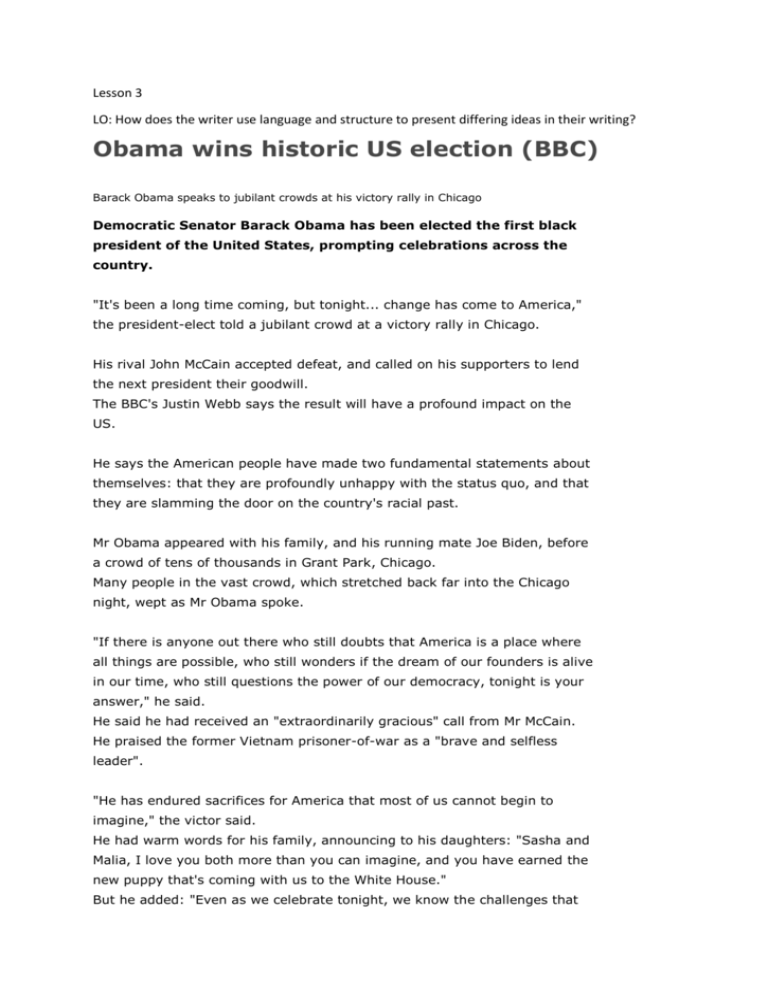
Lesson 3 LO: How does the writer use language and structure to present differing ideas in their writing? Obama wins historic US election (BBC) Barack Obama speaks to jubilant crowds at his victory rally in Chicago Democratic Senator Barack Obama has been elected the first black president of the United States, prompting celebrations across the country. "It's been a long time coming, but tonight... change has come to America," the president-elect told a jubilant crowd at a victory rally in Chicago. His rival John McCain accepted defeat, and called on his supporters to lend the next president their goodwill. The BBC's Justin Webb says the result will have a profound impact on the US. He says the American people have made two fundamental statements about themselves: that they are profoundly unhappy with the status quo, and that they are slamming the door on the country's racial past. Mr Obama appeared with his family, and his running mate Joe Biden, before a crowd of tens of thousands in Grant Park, Chicago. Many people in the vast crowd, which stretched back far into the Chicago night, wept as Mr Obama spoke. "If there is anyone out there who still doubts that America is a place where all things are possible, who still wonders if the dream of our founders is alive in our time, who still questions the power of our democracy, tonight is your answer," he said. He said he had received an "extraordinarily gracious" call from Mr McCain. He praised the former Vietnam prisoner-of-war as a "brave and selfless leader". "He has endured sacrifices for America that most of us cannot begin to imagine," the victor said. He had warm words for his family, announcing to his daughters: "Sasha and Malia, I love you both more than you can imagine, and you have earned the new puppy that's coming with us to the White House." But he added: "Even as we celebrate tonight, we know the challenges that tomorrow will bring are the greatest of our lifetime - two wars, a planet in peril, the worst financial crisis in a century. "The road ahead will be long. Our climb will be steep. But America - I have never been more hopeful than I am tonight that we will get there." Hours after Mr Obama's victory was announced, crowds were still celebrating on the streets of Washington DC and Mr Obama's hometown of Chicago. From red to blue Mr Obama captured the key battleground states of Pennsylvania and Ohio, before breaking through the winning threshold of 270 electoral college votes at 0400 GMT, when projections showed he had also taken California and a slew of other states. Then came the news that he had also seized Florida, Virginia and Colorado - all of which voted Republican in 2004 - turning swathes of the map from red to blue. Projected results have yet to be announced for the states of North Carolina and Missouri, which are believed to be too close to call. However, at 1100 GMT, Mr Obama's share of the popular vote stood at 52.3%, compared with Mr Obama tells his supporters: "Change has come to America." McCain's 46.4%. The main developments include: Mr Obama is projected to have seized Ohio, New Mexico, Iowa, Virginia, Florida, Colorado, Indiana and Nevada - all Republican wins in 2004. He is also projected to have won: Vermont, New Hampshire, Pennsylvania, Illinois, Delaware, Massachusetts, District of Columbia, Maryland, Connecticut, Maine, New Jersey, Michigan, Minnesota, Wisconsin, New York, Rhode Island, California, Hawaii, Washington, Oregon. Mr McCain is projected to have won: Montana, Alaska, Kentucky, South Carolina, Oklahoma, Tennessee, Arkansas, Alabama, Kansas, North Dakota, Wyoming, Georgia, Louisiana, West Virginia, Texas, Mississippi, Utah, Arizona, Idaho, South Dakota. Turnout was reported to be extremely high - in some places "unprecedented". The Democrats increased their Senate majority by five seats, but fell short of the 60 needed to stop blocking tactics by Republicans. They also increased their majority in the House of Representatives. Exit polls suggest the economy was the major deciding factor for six out of 10 voters. Nine out of 10 said the candidates' race was not important to their vote, the Associated Press reported. Almost as many said age did not matter. Several states reported very high turnout. It was predicted 130 million Americans, or more, would vote - more than for any election since 1960. Obama Wins Election; McCain Loses as Bush Legacy Is Rejected Barack Hussein Obama was elected the 44th president of the United States on Tuesday, sweeping away the last racial barrier in American politics with ease as the country chose him as its first black chief executive. Mr. Obama’s election amounted to a national catharsis — a repudiation of a historically unpopular Republican president and his economic and foreign policies, and an embrace of Mr. Obama’s call for a change in the direction and the tone of the country. But it was just as much a strikingly symbolic moment in the evolution of the nation’s fraught racial history, a breakthrough that would have seemed unthinkable just two years ago. Mr. Obama, 47, a first-term Democratic senator from Illinois, defeated Senator John McCain, Republican of Arizona, a former prisoner of war who was making his second bid for the presidency. Mr. McCain offered a gracious concession speech at the Biltmore Hotel in Phoenix shortly after 11:15 p.m. Eastern time, quieting his booing supporters more than once when he mentioned Mr. Obama’s name. “Senator Obama has achieved a great thing for himself, and for his country,” he said, adding that he was sorry that Mr. Obama’s grandmother, Madelyn Dunham, who helped raise him during his teenage years, had not lived to see the day; she died on Sunday. “These are difficult times for our country, and I pledged to him tonight to do all in my power to help him lead us through the many challenges we face,” Mr. McCain said. “I urge all Americans who supported me to join me in not just congratulating him, but offering our next president our goodwill and earnest effort to find ways to come together.” To the very end, Mr. McCain’s campaign was eclipsed by an opponent who was nothing short of a phenomenon, drawing huge crowds epitomized by the tens of thousands of people who turned out to hear Mr. Obama’s victory speech in Grant Park in Chicago. Mr. McCain also fought the headwinds of a relentlessly hostile political environment, weighted down with the baggage left to him by President Bush and an economic collapse that took place in the middle of the general election campaign. The day shimmered with history as voters began lining up before dark — hours before polls opened — to take part in the culmination of a campaign that, over the course of two years, commanded an extraordinary amount of attention from the American public. As the returns became known, and Mr. Obama passed milestone after milestone, winning Ohio, Pennsylvania, New Hampshire, Iowa and New Mexico — many Americans rolled into the streets to celebrate what many described, with perhaps overstated if understandable exhilaration, a new era in a country where just 143 years ago, Mr. Obama, as a black man, could have been owned as a slave. For Republicans, especially the conservatives who have dominated the party for nearly three decades, the night represented a bitter setback and left them contemplating where they now stand in American politics. Mr. Obama led his party in a decisive sweep of Congress, putting Democrats in control of both the House and the Senate — by overwhelming numbers — and the White House for the first time since 1995, when Bill Clinton was president. The president-elect and his expanded Democratic majority now faces the task of governing the country through a difficult period: the likelihood of a deep and prolonged recession. The roster of defeated Republicans included some notable party moderates — including Senator John Sununu of New Hampshire and Rep. Chris Shays of Connecticut— signaling that the Republican conference that convenes in Washington next January will not only be smaller, but more conservative.



